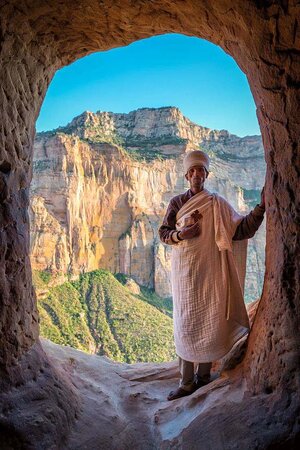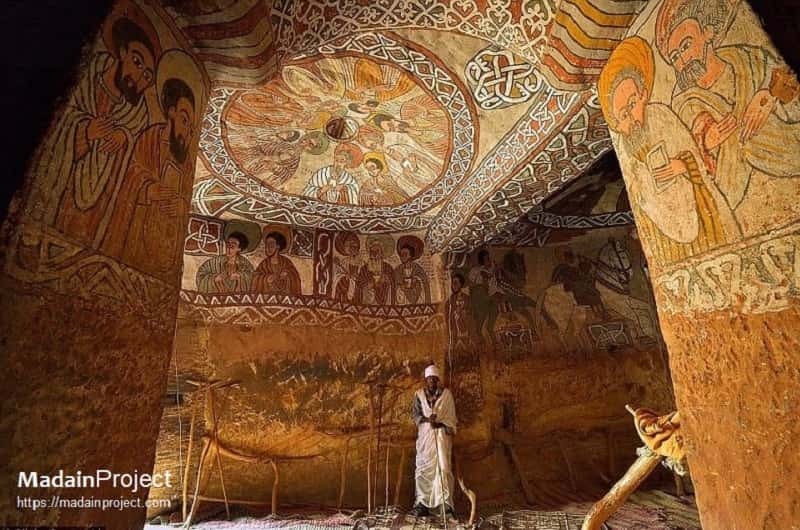Abuna Yemata Guh is an extraordinary rock-carved church located in the Hawzen Woreda district of the Tigray Region in northern Ethiopia. It is a remarkable testament to Ethiopia’s deep Christian history, being one of the country’s oldest churches, dating back to around 400 A.D. Perched on a steep cliff face at an elevation of 2,580 meters (8,460 feet) above sea level, Abuna Yemata Guh is renowned for both its spiritual significance and the extreme physical effort required to reach it.
1. Historical Background and Religious Importance
Abuna Yemata Guh is part of the ancient Tigray rock-hewn churches, a collection of over 120 churches carved directly into mountains and cliffs throughout the region. These churches date back as far as the 4th to 6th centuries A.D., around the time when Christianity became established in Ethiopia.
The church is named after Abuna Yemata, one of the Nine Saints who is said to have arrived in Ethiopia from the Byzantine Empire to spread Christianity in the 5th century. These missionaries are credited with establishing monasteries and churches throughout the country. Legend holds that Abuna Yemata himself chose this remote and elevated spot to carve out his church as a way to be closer to God and to avoid the distractions of the world below.

2. The Remarkable Location and the Journey to Reach the Church
What sets Abuna Yemata Guh apart is its dramatic location. The church is carved into a sheer cliff face, accessible only by a harrowing trek that includes walking narrow paths, scaling vertical rock walls, and crossing ledges with significant drops below. There are no safety ropes or equipment, making the journey challenging and not for the faint of heart.
- The Ascent: Visitors must climb up steep inclines, cross natural rock bridges, and cling to handholds etched into the stone. The ascent is part of the pilgrimage for those visiting the church, symbolizing their spiritual devotion and trust in God.
- Breathtaking Views: From the church, the view is spectacular, offering panoramic vistas of the surrounding mountains and valleys of Tigray. The isolation and height of the church add to its mystical aura, as if suspended between earth and heaven.

3. Architecture and Interior of Abuna Yemata Guh
Despite the extreme location, the interior of the church is beautifully preserved. The church is relatively small, with a simple yet elegant design typical of the early Christian rock-hewn churches in Ethiopia.
- Frescos and Artwork: Inside the church, the walls are adorned with centuries-old frescoes that depict Biblical scenes, saints, and angels. These paintings, created using natural pigments, remain vibrant despite their age, and are considered some of the finest examples of early Christian art in Ethiopia.
- Carved Archways and Columns: The church is notable for its intricately carved archways and columns, showcasing the skill of the craftsmen who shaped the rock into a place of worship. The design reflects influences from Byzantine and early Ethiopian Christian architecture, blending local traditions with the broader Christian world.
4. Cultural and Spiritual Significance
For the local Tigrayan people, Abuna Yemata Guh is not just a historical monument but a living place of worship. Services are still held here regularly, and pilgrims make the treacherous climb to attend baptisms, weddings, and religious festivals.
- Symbol of Faith: The perilous journey to the church is seen as an act of faith. The belief is that God will protect those who come in devotion, and that the experience of reaching the church is a form of spiritual purification.
- Ethiopia’s Ancient Christian Heritage: Ethiopia has a unique Christian tradition, tracing its roots back to the 4th century, when the Aksumite Empire adopted Christianity as its state religion. Abuna Yemata Guh is a symbol of this ancient Christian legacy and the strong ties that Ethiopia has maintained to its early religious heritage.

5. Visiting Abuna Yemata Guh Today
For adventurous travelers and those seeking spiritual enrichment, a visit to Abuna Yemata Guh is an unforgettable experience. The challenging trek adds to the sense of accomplishment, while the remote and sacred atmosphere of the church makes it a profoundly moving destination.
- Best Time to Visit: The best time to visit is during the dry season, from October to March, when the paths are less slippery and the weather is more favorable for climbing.
- Guides and Local Support: Local guides are available to assist visitors during the climb, and it is highly recommended to go with someone experienced. Although the journey can be intimidating, the support of the local community adds reassurance.
6. Conclusion: A Journey into Faith and History
Abuna Yemata Guh is not only an architectural wonder, but a place where faith and history converge. It offers visitors a rare glimpse into Ethiopia’s ancient Christian traditions while providing a physically challenging yet deeply spiritual experience. The church’s isolated location, coupled with its stunning frescoes and unique design, makes it one of the most extraordinary and memorable destinations in the world.
For those willing to make the climb, Abuna Yemata Guh offers more than just a breathtaking view—it offers a journey into the heart of Ethiopia’s spiritual and cultural heritage.

